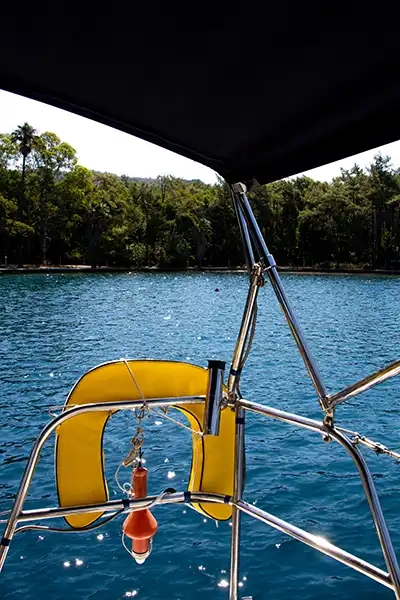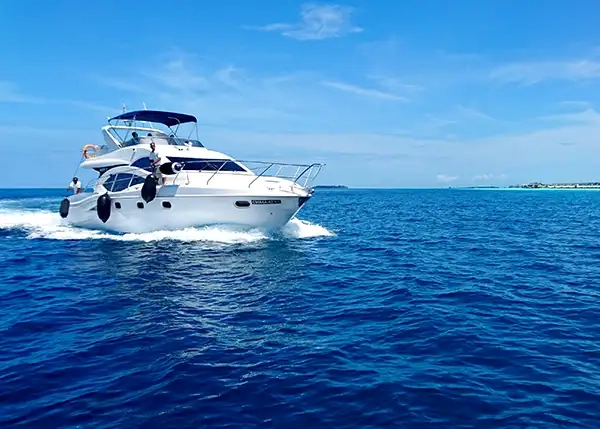How to rent out your boat to other individuals?
Do you own a boat and wonder how to make the most out of your investment? Why not rent it out to private individuals? The peer-to-peer rental market is booming, and suits many boat owners. There are many reasons for this.
In this guide, we’ll take a look at boat sharing, highlighting its advantages. We’ll then take a look at what it entails, and finish off with a look at how specialized boat rental platforms work. This will give you the basics you need to get started.
How can you maximize the profitability of your boat with peer-to-peer boat rental?
To rent out your boat, you first need to prepare a detailed ad. It must mention the boat’s characteristics, equipment, availability and rental conditions. You can choose to use one or more platforms focusing on collaborative boating. They’ll act as intermediaries between you and the hirers, giving you visibility and simplifying the paperwork. Alternatively, you can choose to use generalist classified sites, or even forums or newsgroups to get the word out about your ad. In this case, it will be up to you to manage your boat rental from A to Z.

No need to manage contract details.
You can either choose to advertise through a collaborative platform, via classified ad sites, or some social media groups. However, if you opt for the latter options, it will be your responsibility to get the chartering parties to sign the contract and onboard them.
It’s also worth noting that there are two types of boat sharing: rental for sailing and dockside rental. The former is more common, allowing renters to sail, cruise or engage in water sports. The second is similar to Airbnb or Booking. Individuals can book your boat to spend one or more nights in port, without actually sailing.
Finally, a word of clarification: income generated by renting out your boat is likely to be subject to tax. It is therefore advisable to find out about the tax obligations linked to this extra business activity in your jurisdiction. What’s more, occasional boat sharing is likely different from professional rental. In the former case, you can rent out your boat as a private individual. In the latter case, you’ll need to set up a company.

The benefits of peer-to-peer boat rental
Renting out your boat can prevent you needing to winterize it. If your boat is unused for several months each year, it needs to be decommissioned, or even stored, and recommissioned the following year. Regular use of your boat is beneficial for its general upkeep. A boat that operates all year round is less likely to suffer from ventilation issues, for example. The engine is also less likely to experience failures when it is not subject to long periods of downtime.
Collaborative boating is an interesting option if you’re looking to make the most of your boat, while optimizing its uptime. In fact, there is a growing demand for boat rental between private individuals. This is particularly true during busy summer periods. So if you have a boat that isn’t used all the time, you can profit from this. Depending on your location, your boat can be rented all year round, or at least during the shoulder season.

Last but not least, private boat hire can be a great experience, both for your customers and yourself. They get to discover unforgettable places. As for you, if managing the rental by yourself, it’s a way to meet other people passionate about boats. This allows you to meet people who share the same interests.
Requirements for chartering your boat
Does this concept appeal to you? Keep in mind, however, that a few conditions must be met.
First of all, it’s important to check that your insurance policy effectively extends to renting out your boat. Insurance companies usually offer comprehensive or wide-ranging policies. Some include charter, but this is not always the case. So it’s essential to thoroughly read the fine print in your insurance contract. If in doubt, contact your insurer for clarification. Finally, note that some platforms offer daily insurance solutions. This is an interesting alternative.

Then, more than ever, you’ll need to make sure that your boat has all the required safety equipment: life jackets, lifebuoys, flares, life rafts and so on. To make sure you’re up to date on the maintenance, Ready4Sea can be a great help. Our digital toolbox for boats features checklists, maintenance plan, logbook, job lists. All of these will boost the confidence of your hirers so they know they’re renting a safe boat.
Once these checks have been carried out, if you’re renting your boat from one person to another, you’ll need to draw up a charter contract to provide a legal framework for the rental. It must contain all the information relating to the rental: dates, rates, equipment available, etc. It also specifies the responsibilities of each party (owner and renter).
Finally, it’s worth knowing that you can choose to rent out your boat with or without a professional skipper. This option may be requested by some potential renters, or may be suggested by some boat rental platforms. Depending on your location and flag, a crewed boat package may require a different registration than for a bareboat. Generally, the renter can hire a separate skipper if he wishes to.

How do boat sharing platforms work?
As with homes and vehicles, peer-to-peer boat rental platforms are rapidly expanding. These platforms offer a wide choice of boats for rent, from simple rowboats to luxury yachts, in many locations around the world. So maybe there’s a place for yours.
In fact, if you decide to use a boat rental platform, it will generally handle :
- giving your ad greater visibility,
- managing the availability calendar,
- drawing up and signing the rental contract,
- and, in some cases, performing check-in and check-out.
Among these platforms feature Boatsetter, GetMyBoat, Click&Boat, Samboat and Boatflex. They enable private individuals to rent out their boats for river or maritime cruises. Renters can choose from a wide range of boats, at affordable prices and for flexible rental periods.

What’s more, you can directly compare prices with other boats offered on these platforms. This will help you find the right price for your boat. There are several criteria to take into account, such as the area where your boat is located, the type of boat you are listing, as well as its condition and features. Make sure you set a price in line with market demand and the competition.
In addition to the size of the fleet they have on offer, and therefore also the audience they attract, one of the criteria will certainly be the platform’s fee structure. Some charge a percentage of the rental amount (often around 15-20%). Others charge a flat fee. You should also find out about the cancellation conditions on each website. In most cases, you can specify what you prefer. For example, you could be able to select pre-determined conditions based on the cancellation date.

Get started with boat sharing!
In short, renting out your boat to other people is an attractive option for boat owners. You’ll enjoy the best possible return on your boat, optimize its use, and ensure that your investment lasts as long as possible. To charter your boat privately, just get started with the simple steps we discussed, whether you opt for boat sharing platforms or classified ads or groups and forums. Just make sure you meet the required conditions and you’ll be ready to dive in!
Subscribe to our monthly newsletter to receive tips on keeping your boat in good health.
